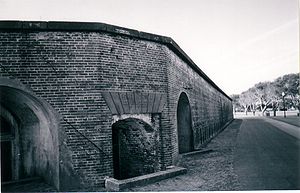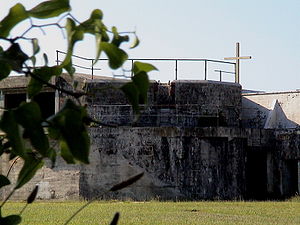- North Carolina Baptist Assembly
-
The North Carolina Baptist Assembly is a Christian retreat owned and operated by the Baptist State Convention of North Carolina, the state's largest denomination. The grounds of the retreat, on the eastern end of Oak Island, is the former site of Fort Caswell, a military base that was occupied by various branches of the U.S. armed forces for most of the period between 1836 and 1945. Most people still call the Baptist Assembly Fort Caswell.
Contents
Fort Caswell
The original fort, named after former governor Richard Caswell and completed in 1836 at a cost of $473,402, was fortified with both brick walls and large earthworks in a pentagonal design. Fortified with over 61 gun emplacements, it guarded the mouth of the Cape Fear River, and was a key in the defense of Wilmington an important port 20 miles upriver and, at the time, the state's largest city. When the issue of secession was debated in 1861, it was seized twice by a group called the "Cape Fear Minutemen", who were subsequently ordered by Governor John Willis Ellis to return it to the keeper of the fort, the only man stationed there by the U.S. Army at the time. [1]
When the state finally seceded, the new Confederate Army made it, along with nearby Fort Fisher, the key to arguably the most elaborate defensive system in the world at the time (Fort Fisher guarded the other inlet to the Cape Fear River). This system, along with swift blockade runners, kept Wilmington's port open longer than any other. No fewer than six plans were devised to capture the fort, but its imposing defenses and the Frying Pan Shoals just offshore deterred them; the Union Army then diverted its attention to Fort Fisher. After a massive Union assault captured Fort Fisher on January 15, 1865, orders came to spike Fort Caswell's guns, burn the barracks, and explode the magazines. On January 17, the magazines were ignited, exploding approximately 100,00 pounds of powder (reports at the time state that the blast could be heard as far as 100 miles away in Fayetteville). As a result of the explosion, one whole wall of the fort was destroyed. Amazingly, at no time during the Civil War was any soldier stationed at Caswell killed by enemy fire; however, several died of disease and one deserter was executed by firing squad. The loss of the Confederacy's last port was a major factor in Robert E. Lee's decision to surrender at Appomattox. [1]
The U.S. Army built a full military reservation on the site in the 1890s, complete with coastal artillery batteries, but would be abandoned after World War I. Most of the buildings at the Assembly were built at this time, as well as the sea wall. From 1937-1941, it was unsuccessfully converted into a resort, with the gun emplacements used as swimming pools (two artesian wells, producing hot mineral water, were used to fill the pools). In 1941, the Navy purchased the fort for use as a small anti-submarine base during World War II. [1]
The North Carolina Baptist Assembly
The 250-acre (1.0 km2) property was abandoned by the Navy after World War II and was purchased by the Baptist State Convention of North Carolina as surplus property for a mere $86,000 in 1949. It is now used as a year-round coastal retreat and conference center for churches, associations, agencies, and other affiliates of the Baptist State Convention. One of the facility's main purposes has been to serve as a camp for the youth of North Carolina's Baptist churches, especially during the summer months.
Because of the influx of visitors during summer youth weeks, young adults and college students are hired to live and work at the assembly; they are known as the summer staff. Many of the current full-time employees and administration started out as summer staff in years past.
The facilities, which include housing and program buildings such as Hatch Auditorium, are also used by non-Baptist church and educational groups. It can accommodate over 1,000 people at a time. It still occasionally houses military personnel who have been stationed at the Sunny Point Military Ocean Terminal, a military port north of nearby Southport, during conflicts such as Operation Desert Storm. [1]
References
External links
Categories:- Buildings and structuresBrunswick County, North Carolina
- Christianity in North Carolina
- Forts in North Carolina
Wikimedia Foundation. 2010.


